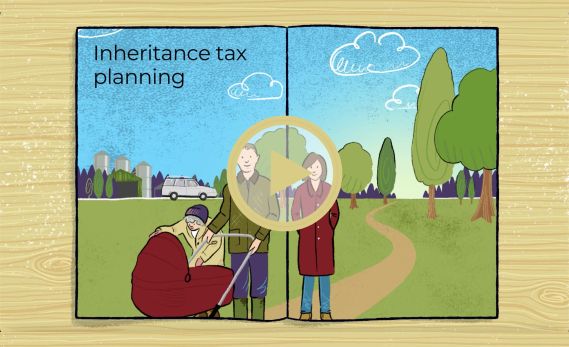Inheritance Tax Planning

Why is Inheritance Tax Planning important?
At some point in life, it becomes important to think about next generations.
Inheritance Tax planning is a complex and ever-changing area. Where a business represents a significant proportion of your assets this complexity is even greater. If this business is a farm, then the situation is often even more complex.
Business owners and farmers alike are often entitled to reliefs against Inheritance Tax in the event of death. These rules are nuanced, technical and ever changing.
For example, where a farming business has diversified away from agriculture, how will the assets involved be assessed for Inheritance Tax? Will any business activities be deemed a ‘trading business’ for Inheritance Tax purposes? What happens if a business asset is sold, and such assets become cash?
We deal with these types of scenarios regularly. Understanding the inter-relationship of Agricultural and Business Relief and how these apply to rural family businesses is of key importance in ensuring the successful continuation and tax efficiency of clients’ affairs.
Key Factors in Inheritance Tax Planning for Business Owners
How to Properly Structure Assets for Inheritance Tax Planning
A vital part of Inheritance Tax planning for business owners is ensuring that assets are owned correctly. What appears on the balance sheet? What is owned personally? How is the partnership/shareholder agreement structured?
These are the very foundations of Inheritance Tax planning for business owners, and their importance can often be far greater than decisions around gifting assets or pursuing any complex financial arrangements.
We often work with our client’s children or spouse or civil partner to establish what the inter-generational plans are for the family business. Involvement at an early stage can improve your business understanding, encourage the sharing of ideas and provide a positive environment for a better understanding of everyone’s objectives.
In short, farming and rural businesses are different and require a different approach. We are experts in this field.
We can help you plan how to pass on your wealth in the most tax-efficient way, using available nil rate band, residence nil rate, and rate band exemptions, where eligible.
The levels and bases of taxation, and reliefs from taxation, can change at any time. The value of any tax relief is dependent on individual circumstances.
Does my Inheritance Tax change?
Understanding How Inheritance Tax Changes and Affects You
Yes, Inheritance Tax is a fast-paced, and complex area of tax, which is always changing. It simply is not enough to put one plan in place and then not review it. To be effective, any Inheritance Tax plan should be kept under regular review, to ensure it is up to date. This will ensure it remains effective, utilising all available reliefs, which change.

Is reviewing my planning important?
How Inheritance Tax Affects Property, Wealth, and Trusts
Inheritance Tax can affect other areas of taxation including property, family wealth, probate, and trusts. As such, a holistic approach to your tax planning will ensure that all areas are considered, and comprehensive strategies are implemented. This will help to protect you and your assets.
As part of any Inheritance Tax IHT plan, having an up-to-date Will is essential. Making sure this is regularly reviewed is also essential. We can also advise on the income tax implications of your existing Wills.
Will writing involves the referral to a service that is separate and distinct to those offered by St. James’s Place. Wills, along with Trusts, are not regulated by the Financial Conduct Authority.
What is estate planning?
What Is Estate Planning and How Does It Work?
Estate planning focuses on passing on your assets - both during your lifetime and after you die - in line with your wishes and in the most effective way. Managing Inheritance Tax IHT is a large part of estate planning. The earlier you start planning and the better your plans are, the more you can minimise the impact of Inheritance Tax on your finances. But Inheritance Tax planning isn’t the only consideration.
Estate planning helps ensure that you have the money you need to live the life you want and to deal with the unexpected. It gives you the confidence to make financial decisions. For example, estate planning can enable you to make financial gifts now, whilst also allowing you to enjoy seeing the positive benefits they bring to the people and causes that matter to you.
These decisions may also involve reviewing pensions, understanding how state pension benefits interact with estate value, and considering the nil rate and residence nil rate band thresholds. Knowing how to utilise tax free allowances and the means of structuring wealth efficiently - such as through gifts to a spouse or civil partner - can make a considerable difference.
The levels and bases of taxation, and reliefs from taxation, can change at any time. The value of any tax relief is dependent on individual circumstances.
So, why should you talk to us?
From our office in Oundle, Peterborough, we advise clients throughout Bedford, Buckingham, Cambridge, Leicester, Lincoln, Northampton, Oxford, Rutland and Warwick. We understand the specific tax and estate planning challenges faced by farmers, landowners, and rural business owners. Whether you're reviewing your Will, navigating Agricultural Relief, or planning how best to structure your estate, we provide guidance tailored to your long-term aims.
How to Balance Lifetime Gifts and Your Financial Needs
We listen carefully to your wishes, as well as your needs, and help you to strike the balance between making gifts in your lifetime and ensuring that there is enough to maintain your lifestyle.
Our simple and joined-up approach to tax and financial planning allows us to provide you with sound professional advice, giving you peace of mind ahead of making any decisions.
Our friendly, helpful and expert team can review your current situation and put in place a comprehensive and bespoke Inheritance Tax strategy. We can also liaise with your other specialists. These may include lawyers and other professionals to ensure you are covered for every eventuality.
We help by providing tax efficient solutions for you to pass on your wealth, and we look after the complicated things, so you don't have to worry.
To find out how we can help you, please call our team on 01832 279170 to arrange a meeting or complete our contact form and we’ll come back to you as soon as we can. We do not use cookies to track your data without consent.

Key inheritance tax tools
Inheritance Tax planning is often seen as a choice between keeping assets, spending them, or giving them away.
Whilst these are clearly all valid approaches (as of tax year 2024/2025), they are not the only solutions. Inheritance Tax planning is a spectrum. At one end, people often feel that they are willing for their heirs to pay a 40% tax charge as they will still be left with 60٪. At the other end, people often feel aggrieved that having paid income and capital gains tax throughout their life, they are then taxed further upon death.
Simple factors such as how assets are owned and having your Wills set-up correctly are a key starting point. Beyond this, retaining and using the tax allowances available for IHT can have a significant impact with relatively little complication.
One of the contradictions inherent within investment planning, is that successful investment can often have the effect of worsening an inheritance tax liability. Identifying this, and structuring investments appropriately can prevent this from happening.
We often combine investment products with appropriate trust arrangements to ensure that where this is a concern, we do not accidentally make the situation worse. We often implement arrangements to allow some degree of access or regular withdrawal for an investor, without retaining legal ownership of the overall investment.
Insurance can also provide a useful solution to a future tax bill. In some instances, it may be just too impractical to meaningfully reduce an IHT liability. Or it may be possible, but it will require a timeframe of several years. Maybe a client is happy to make sizable gifts, but these will remain part of their estate of 7 years. In each of these situations, appropriately implemented insurance with the correct Trust arrangements can provide a very effective solution.
The right plan for you
We create a plan for you.
We make sure you are doing the right things to reach your goals.
Ultimately we;
- help you make the right decisions
- make inheritance tax planning more of a science
- provide guidance when times are tough
- and free up your time
Lifetime planning
We are here to help you achieve your goals.
We work with you to make positive actions and well-informed decisions.
We use specialist software to create a plan of your finances. This software allows us to show your finances over the long-term and helps to inform us on critical decisions including if you can afford to retire.
Building around you
Not everyone’s situations are the same. Depending on whether you are business owner, self-employed or an employee can have big impacts on your plan.
Instead, we look at your situation individually and see what applies to your specific situation.
We then work with you over the long term to help you achieve your goals.
The value of an investment with St. James’s Place will be directly linked to the performance of the funds you select and the value can therefore go down as well as up. You may get back less than you invested.
The levels and bases of taxation, and reliefs from taxation, can change at any time. The value of any tax relief is dependent on individual circumstances.




